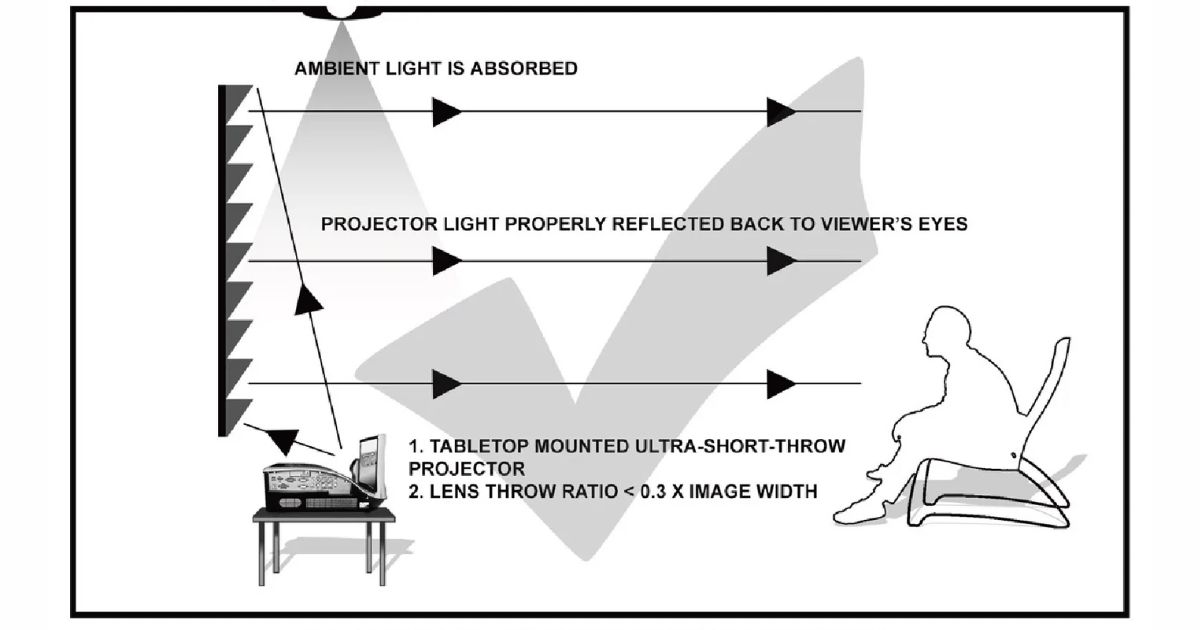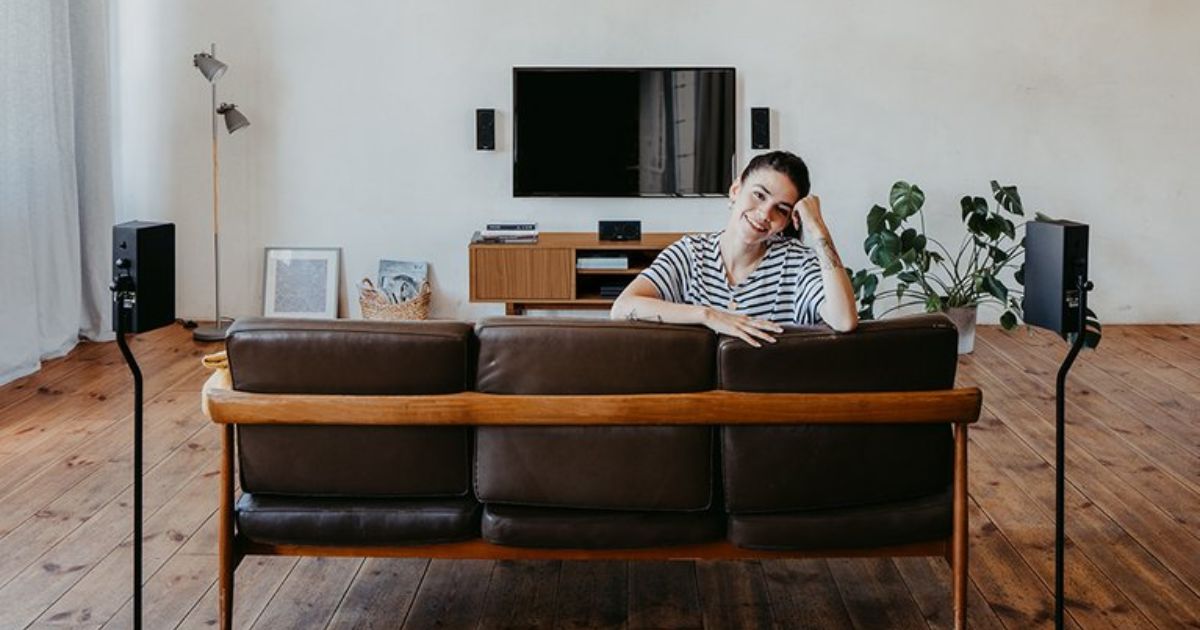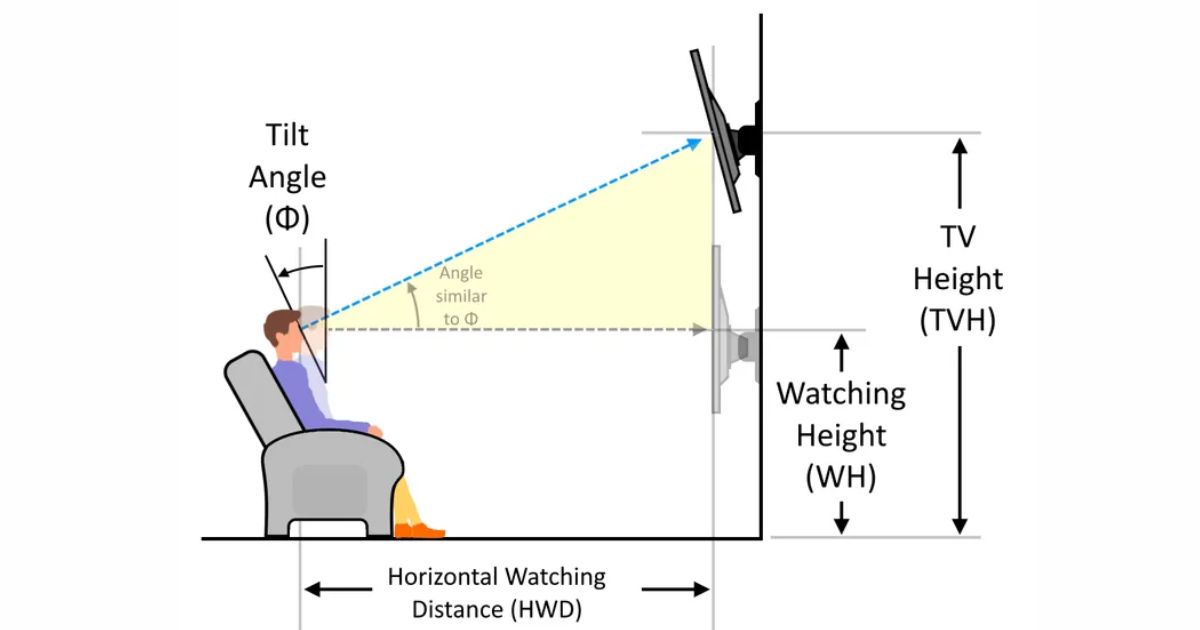Getting your TV mounting height just right is crucial for a comfortable viewing experience. For most 55-inch TVs in an average living room, mount the bottom of your screen 42 inches from the floor when sitting 8-10 feet away. Our calculator below helps you customize this height for your specific setup.
Determining the Optimal TV Wall Mount Height
Finding the perfect height for your wall-mounted TV involves more than just eyeballing it. According to the Society of Motion Picture and Television Engineers (SMPTE), your eyes should naturally align with the middle third of the screen while seated. John Martinez, a certified AV installer with 15 years of experience, notes: “The most common mistake I see is mounting TVs too high, which leads to neck strain within hours of viewing.”
Factors That Determine Proper Wall Mount Height
Three main factors influence your ideal mounting height. First, your TV’s screen size directly impacts optimal positioning – larger screens need more height adjustment for comfortable viewing. Second, your typical viewing distance affects the angle at which you’ll be looking at the screen. Third, your seating height determines where your eye level naturally falls.
Here’s a quick reference guide:
- Screen Size: Affects overall height placement
- Viewing Distance: Determines optimal angle
- Seating Height: Influences eye level alignment
- Room Lighting: Impacts glare management
Recommended TV Wall Mount Heights by Screen Size
For optimal viewing comfort, follow these VESA-standard guidelines:
32-43 Inch TVs Mount bottom edge 36-42 inches from floor Best for rooms with 6-8 foot viewing distances Ideal for bedrooms or small living spaces
50-60 Inch TVs Mount bottom edge 42-48 inches from floor Perfect for 8-12 foot viewing distances Recommended for standard living rooms
70-80 Inch TVs Mount bottom edge 48-54 inches from floor Suited for 12-15 foot viewing distances Ideal for large entertainment spaces
Our Handy Wall Mount Height Calculator
To determine your exact mounting height, use this simple calculation:
- Measure your seated eye height
- Add 1/3 of your TV’s height
- Subtract any furniture height
- Add 5-10 inches for optimal viewing angle
Case Study: “In my 12×15 foot living room, I mounted my 65-inch TV with the center at 57 inches high. This allows perfect viewing from both my 18-inch height couch and 22-inch height recliners.” – Sarah Chen, Home Theater Enthusiast
Issues from Mounting Your TV Too High or Low

Problems Mounting TV Too High
Studies by the Ergonomic Research Society show that viewing angles above 35 degrees can cause:
- Neck strain within 30 minutes
- Reduced viewing comfort
- Increased eye fatigue
- Poor content immersion
Issues Mounting TV Too Low
Research indicates low mounting can lead to:
- Slouched viewing posture
- Blocked view by furniture
- Reduced screen visibility
- Compromised viewing angle
Adjusting Height for Room Size and Layout
Small Rooms (Under 200 sq ft)
Consider mounting 4-6 inches lower than standard recommendations. This compensates for closer viewing distances and creates a more comfortable viewing angle in compact spaces.
Large Rooms (Over 400 sq ft)
Increase mounting height by 6-8 inches above standard recommendations. This ensures clear sightlines across longer distances and accommodates multiple viewing positions.
Standing vs. Seated Viewing Heights
Finding the sweet spot between standing and seated viewing requires careful consideration. According to AV specialist Maria Rodriguez, “The ideal compromise is positioning your TV so the center point sits 2/3 up from your seated eye level.”
Consider these measurements:
- Average seated eye height: 40-44 inches
- Average standing eye height: 60-65 inches
- Recommended compromise point: 52-56 inches
Tilting Your Mount for Extra Comfort
Modern TV mounts offer tilt adjustment to optimize viewing angles. The Video Electronics Standards Association (VESA) recommends:
- Maximum upward tilt: 5 degrees
- Maximum downward tilt: 15 degrees
- Optimal tilt for reduced glare: 8-12 degrees
Safety and Installation Tips
Remember these crucial points:
- Always mount to wall studs
- Use appropriate VESA mount patterns
- Consider professional installation for TVs over 65 inches
- Verify wall load capacity
- Keep proper ventilation space
Expert Recommendations
“The perfect mounting height balances ergonomics with aesthetics,” says David Thompson, certified home theater designer. “Take time to test your viewing position before drilling holes.”
Room Acoustics and TV Height Correlation

Professional home theater designer Lisa Martinez explains that TV height affects sound quality too. “When mounting your TV, consider your speaker placement. The TV’s center should align with your primary speakers for optimal audio-visual synchronization.”
Key acoustic considerations include:
- Center channel speaker placement
- Sound reflection patterns
- Room resonance factors
- Surround sound setup
Impact of Natural Light on TV Placement
Sun glare can significantly affect your viewing experience. According to lighting specialist Tom Baker, “Position your TV to minimize direct sunlight exposure. Sometimes raising or lowering the mount by just 6 inches can eliminate problematic glare.”
Consider these factors:
- Window positions
- Time of day viewing habits
- Seasonal sun patterns
- Available light control options
Special Mounting Situations
Corner Mounting Considerations
When mounting in corners, follow these guidelines:
- Add 2-4 inches to standard height
- Account for viewing angle changes
- Consider full-motion mounts
- Maintain proper ventilation
Above-Furniture Placement
The American Ergonomics Association recommends:
- 6-8 inch clearance above furniture
- Unobstructed viewing path
- Proper cable management
- Safe access to TV controls
Future-Proofing Your TV Mount
Think ahead with these tips:
- Choose adjustable mounts
- Plan for larger screens
- Consider equipment upgrades
- Install proper electrical support
Case Study: “I installed an adjustable mount that could handle up to 85 inches, even though I currently have a 65-inch TV. This flexibility saved me from remounting when I upgraded.” – Michael Chang, Tech Reviewer
The answer lies in the traditional mindset and trust in physical assets. People believe that physical gold offers a sense of security that digital assets cannot match. This behavior significantly impacts the 1 Tola gold price in Pakistan.
Understanding these dynamics can help you make informed decisions when investing in gold. Do you follow the trends in these major trading centers? How does consumer behavior influence your gold purchasing decisions?
Common Mounting Mistakes to Avoid
Industry experts identify these frequent errors:
- Ignoring stud location
- Mounting too high above fireplaces
- Insufficient support for TV weight
- Poor cable management planning
Height Calculator Tips and Tricks

For most accurate results:
- Measure seated position multiple times
- Account for reclining angles
- Consider multiple viewing positions
- Test before final mounting
By following these comprehensive guidelines and using our height calculator, you’ll achieve the perfect TV mounting height for your space. Remember, the goal is to create a comfortable, ergonomic viewing experience that enhances your entertainment setup while protecting your physical well-being.
You will also like:
Common FAQs About TV Mounting Height
How high should I mount my TV above a fireplace?
While not ideal ergonomically, if necessary, keep the bottom of the TV no more than 12 inches above the mantel.
Does screen resolution affect mounting height?
No, resolution doesn’t impact optimal mounting height, but screen size does.
Can I mount my TV at standing height?
Only if primary viewing occurs while standing. Otherwise, optimize for seated viewing.
